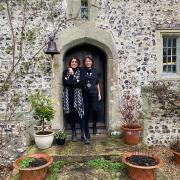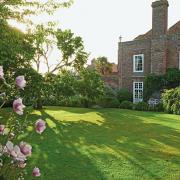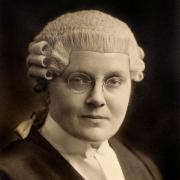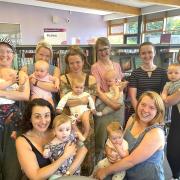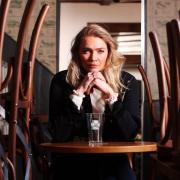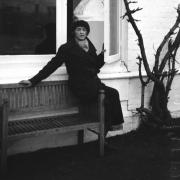Sarah Raven is not only an inspirational cook and gardener, she was also once a doctor – knowledge that informs her new healthy eating cookbook. She talks to us from her idyllic farmhouse in the Sussex Weald
Sarah Raven is my constant companion in the long winter evenings. When the rain is thumping against the window, the wind is cheerfully lifting the slates off the roof and a lone fox is screeching in the chill, inky blackness, there are few things more comforting than the Sarah Raven YouTube channel. Take my word for it. In the dread months of January and February, her tips on creating a hand-tied bunch of flowers, planting summer flower containers or growing a hardy annual cutting patch soon drive those winter blues away.
Spend too long in her bucolic wonderland, however, and the seeds of dissatisfaction will quickly take root. Your barren flower borders, cracked paving slabs and patchy lawn littered with next door’s cat’s unmentionables will leave you restless and malcontented, and you’ll be ordering sweet pea, zinnia and cosmos seedlings, a floristry kit and a year-round veg course, courtesy of sarahraven.com, with a zealous fervour you had no inkling you possessed.
Sarah, of course, is accustomed to green-eyed journalists marvelling at her many accomplishments. Visit her East Sussex home at Perch Hill, near Burwash, in high summer when her garden is heavy with colour and scent, and you’d be mistaken for thinking you’d walked into a heavenly Country Living garden shoot. Come to think of it, there’s a good chance you will have because she’s done a fair few over the years.
And she’s not just a flower expert. She took a degree in history, retrained in medicine to become a doctor at the Royal Sussex County Hospital in Brighton, and after her eldest daughter was born, reinvented herself, setting up a floristry business and a sideline in writing, while establishing a garden and cookery school at the farm she owns with her husband, the writer Adam Nicolson (Vita Sackville-West’s grandson).
Drawing on her lifelong love of cookery and medicine, she has now produced a cookbook packed with recipes which, she guarantees, not only taste delicious but will have a positive effect on your health.
“When I was not on the wards, I was a doctor who cooked, and I became increasingly fascinated by the amount of evidence showing how health is utterly entwined with diet,” she says. “My cooking began to reflect these ideas. I moved away from processed to whole grains and, even in winter, ate more salads, used only the best cold-pressed oils, cooked and ate more soups, and decreased my reliance on dairy.
“For more than 20 years, I’ve grown my own food at Perch Hill, and everything I’ve cooked has revolved around the wonderful things the garden has given me. Fruit and veg are at the heart of the recipes in this book. If you grow your own food, you can ensure that they are grown organically, without being sprayed with insecticides or chemical fertilisers, and you can pick them when they are at their seasonal peak. If you aren’t fortunate enough to be able to grow your own, try to buy seasonally, locally and organic.
“Another insight into the intimate relationship between health and diet came though my holidays to Crete, where I became gripped by statistics about Cretan longevity. They live substantially longer than the rest of us, and significantly longer even than Greeks on the mainland only a few miles away.
“And when I say live, I mean they live in a healthy, integrated and active way. They may be old, but they are not crippled by the illnesses and afflictions of our elderly population. One reason is that they tend not to eat processed foods, nor do they overeat, and they dine sociably, with food and meals bringing people together.
“It used to be thought that some inevitable biological clock was ticking – that’s what made us old – but it is now understood that ageing can be due to the cumulative damage done to our bodies at a cellular level and the increasing inability of our cells to respond to lifestyle, diet and environmental challenges that can lead to disease. If we can find ways of reducing the rate of damage, or increasing the effectiveness of repair mechanisms, we might be able to delay the onset of disease and have a healthier, fitter old age.”
In her new book she outlines a few dietary rules, which include: eating more fruit and vegetables; eating some veg raw and fermented; eating plenty of berries; prioritising good proteins, including eggs; choosing whole grains and pulses; knowing the difference between good and bad fats; banishing processed sugars; watching your salt intake; always eating breakfast; and fasting one day a week.
“I remember coming back from a raw fruit detox and feeding my family freshly-squeezed pineapple and apple juice every morning, and none of us feeling that great after a month,” she grimaces. “And of course we were having the most enormous burst of sugar. You need to be quite careful with fruit. When it hits your gut, it’s absorbed very quickly into your bloodstream and the sugars then cause an insulin spike which lead not only to sugar cravings but screw up your fat storage. You should aim for a diet full of slow-release foods and we should be relying more and more on vegetables.
“If you eat two mouthfuls of protein at the start of a meal it has been proven that you will eat substantially less than if you tuck into salads before the vegetables, fruit and carbs. Fish and eggs are also fantastic. Eggs are not the cause of increasing cholesterol levels among older people. A free-range, ideally organic egg is a perfectly conceived composite item. And if you can poach rather than scramble it, so that it doesn’t absorb animal fats, all the better. Lean meat, such as poultry and game, are also good, as are wholegrain and wholefoods like quinoa, lentils and borlotti beans.”
‘Sensible’ or ‘healthy’ dishes can often be too earnest, she says. But you get no sense of that leafing through her sumptuous cookbook. One of her breakfast dishes, Lighter Eggs Benedict, immediately catches my eye, where low-calorie prosciutto replaces fatty bacon, whole-grain bannocks substitute traditional muffins and iron-rich spinach serves as a nutritious and filling accompaniment.
Or, for a light lunch, how about a summer garden salad sprinkled with protein-packed shrimps and flavourful courgettes, tomatoes and basil?
When she isn’t cooking or writing, most of Sarah’s time is devoted to her thriving mail order company. “Our unique selling point is selling tulips, dahlias and cut flowers in groups of three or four varieties,” she says. “Unlike most mail order companies, everything we sell is grown, trialled and photographed here at Perch Hill.”
She used to pop up regularly on television, either on Gardener’s World or her one-off specials where she championed our bees, butterflies and native wild flowers or shared her enthusiasm for cut flowers. But she says the TV jobs that landed in her lap tended to be very last minute and stressful so instead she is working on a new book focused mainly on colour in the garden. She and Adam are also in the throes of renovating their farmhouse – “the reward for all our years of hard work”.
Having lived at Perch Hill for 22 years, she can’t imagine living anywhere else. “I am totally passionate about this part of Sussex. It feels truly rural and although there are very good commuter trains, it feels very wooded and hilly, and I can see only one house from where I am. I love the country lanes and, even now, I feel I could head off and discover a lane I’ve never been in before. I like this very hidden, secret side of Sussex.”
More…
• Miles Jupp on discovering his Sussex roots, his latest show and appearing in Watership Down - Comedian, actor and The News Quiz host Miles Jupp found out he was a son of Sussex in his mid-30s. Now, writes Jenny Mark-Bell, he is returning to the ancestral soil for a gig














